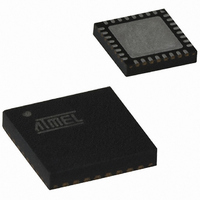AT89C5130A-PUTUM Atmel, AT89C5130A-PUTUM Datasheet - Page 71

AT89C5130A-PUTUM
Manufacturer Part Number
AT89C5130A-PUTUM
Description
IC 8051 MCU FLASH 16K USB 32QFN
Manufacturer
Atmel
Series
AT89C513xr
Datasheet
1.AT89C5130A-PUTUM.pdf
(188 pages)
Specifications of AT89C5130A-PUTUM
Core Processor
C52X2
Core Size
8-Bit
Speed
48MHz
Connectivity
I²C, SPI, UART/USART, USB
Peripherals
LED, POR, PWM, WDT
Number Of I /o
18
Program Memory Size
16KB (16K x 8)
Program Memory Type
FLASH
Eeprom Size
4K x 8
Ram Size
1.25K x 8
Voltage - Supply (vcc/vdd)
2.7 V ~ 5.5 V
Oscillator Type
Internal
Operating Temperature
-40°C ~ 85°C
Package / Case
32-VQFN Exposed Pad, 32-HVQFN, 32-SQFN, 32-DHVQFN
Package
32QFN EP
Device Core
8051
Family Name
89C
Maximum Speed
48 MHz
Operating Supply Voltage
3.3|5 V
Data Bus Width
8 Bit
Number Of Programmable I/os
34
Interface Type
SPI/TWI/UART/USB
Number Of Timers
3
Processor Series
AT89x
Core
8051
Data Ram Size
1.25 KB
Maximum Clock Frequency
48 MHz
Maximum Operating Temperature
+ 85 C
Mounting Style
SMD/SMT
3rd Party Development Tools
PK51, CA51, A51, ULINK2
Development Tools By Supplier
AT89STK-05
Minimum Operating Temperature
- 40 C
Height
0.95 mm
Length
7 mm
Supply Voltage (max)
5.5 V
Supply Voltage (min)
2.7 V
Width
7 mm
For Use With
AT89OCD-01 - USB EMULATOR FOR AT8XC51 MCU
Lead Free Status / RoHS Status
Lead free / RoHS Compliant
Data Converters
-
Lead Free Status / Rohs Status
Details
Other names
AT89C5130A-PUTIM
AT89C5130A-PUTIM
AT89C5130A-PUTIM
Available stocks
Company
Part Number
Manufacturer
Quantity
Price
Company:
Part Number:
AT89C5130A-PUTUM
Manufacturer:
Atmel
Quantity:
5
15.2.2
15.2.3
4337K–USB–04/08
Broadcast Address
Reset Addresses
The SADEN byte is selected so that each slave may be addressed separately.
For slave A, bit 0 (the LSB) is a don’t care bit; for slaves B and C, bit 0 is a 1. To communicate
with slave A only, the master must send an address where bit 0 is clear (e.g. 1111 0000b).
For slave A, bit 1 is a 1; for slaves B and C, bit 1 is a don’t care bit. To communicate with slaves
B and C, but not slave A, the master must send an address with bits 0 and 1 both set (e.g. 1111
0011b).
To communicate with slaves A, B and C, the master must send an address with bit 0 set, bit 1
clear, and bit 2 clear (e.g. 1111 0001b).
A broadcast address is formed from the logical OR of the SADDR and SADEN registers with
zeros defined as don’t care bits, e.g.:
The use of don’t care bits provides flexibility in defining the broadcast address, in most applica-
tions, a broadcast address is FFh. The following is an example of using broadcast addresses:
For slaves A and B, bit 2 is a don’t care bit; for slave C, bit 2 is set. To communicate with all of
the slaves, the master must send an address FFh. To communicate with slaves A and B, but not
slave C, the master can send and address FBh.
On reset, the SADDR and SADEN registers are initialized to 00h, i.e. the given and broadcast
addresses are XXXX XXXXb (all don’t care bits). This ensures that the serial port will reply to any
address, and so, that it is backwards compatible with the 80C51 microcontrollers that do not
support automatic address recognition.
Slave C:SADDR1111 0011b
Slave A:SADDR1111 0001b
Slave B:SADDR1111 0011b
Slave C:SADDR = 1111 0011b
Broadcast = SADDR OR SADEN1111 111Xb
SADEN1111 1101b
Given1111 00X1b
SADDR0101 0110b
SADEN1111 1100b
SADEN1111 1010b
Broadcast1111 1X11b,
SADEN1111 1001b
Broadcast1111 1X11B,
SADEN1111 1101b
Broadcast1111 1111b
AT89C5130A/31A-M
71


















